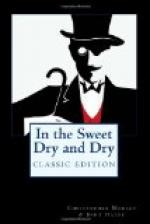“So this is your scheme, is it?” he said. “Abandoned offspring, you deserve the gallows.”
“Wait a moment,” said Quimbleton. “Now comes the other side of the argument. If you grant us this concession we in turn will put you in possession of a magnificent idea. You think that you have prohibited everything. Your vetoes cumber the earth. But there is still one thing you have forgotten to prohibit.”
“What is it?” said the Bishop coldly. His hard face was unmoved, but his eyes brightened a trifle.
“There is one thing you have forgotten to prohibit,” said Quimbleton solemnly. “I can hardly conceive how it escaped you. The one thing that harasses human beings over the whole civilized world. The one thing which, if you were to abolish it, would make your name, foul as that now is, blessed in the ears of men. Oh, the joy of still having something to prohibit! The unmixed bliss and high privilege of the vetoing function! I envy you, from my heart, in still having something to forbid.”
The Bishop stirred uneasily in his chair. “What is it?” he said.
Quimbleton watched him with a steady and slightly annoying smile.
“I like to dwell in imagination upon your surprise when you realize what you have overlooked. It seems so simple! To abolish, prohibit, banish, and remove, at one swoop, the chief preoccupation of mankind! The simple and high-minded felicity of still having something prohibitable subject to your omnipotent legislation! But there, I dare say I am wrong. Probably you are weary of prohibiting things.”
Quimbleton made a motion to his companions as though to leave the room. The Bishop leaped to his feet, with curiously mingled anger and eagerness on his face. “Stop!” he cried. “You can’t mean laughter? I abolished that some weeks ago. I don’t believe there is anything left—”
“How quaint it is,” said Quimbleton (as though talking to himself), “that it is always the plainly obvious that eludes! But, of course, the reason you have not abolished this matter before is that to do so would wholly alter and undermine the habits of the race. Nothing would be the same as before. I daresay a good deal of misery would be caused in the long run, who knows? Ah well, it seems a pity you forgot it—”
“Hell’s bells!” roared the Bishop, bringing his fist down on the desk with fury—“What is it? Let me get at it!”
“I should be sorry to marry into a profane family,” was Quimbleton’s reply, moving toward the door.
The Bishop chewed the end of his beard with a crunching sound. This unpleasant gesture caused a tingle to pass along Bleak’s sensitive spine, already strained to painful nervous tension. The office of the Perpetual Souse hung in the balance.
“Look here,” said Bishop Chuff, “If I let you have your way about the—the Permanent Exhibit, will you tell me what it is I have forgotten to prohibit?”




